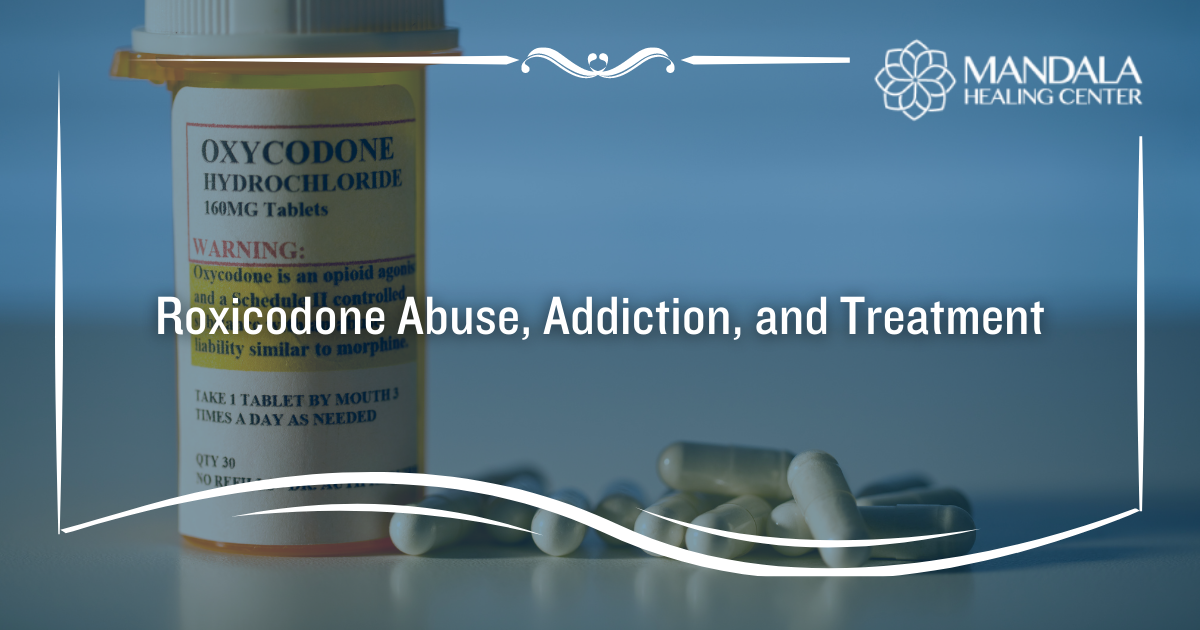Opioids are a class of drugs used to treat the symptoms of pain. More often than not, these medications are only prescribed for a short period after an injury or surgery. However, some people may take these medications long-term if they suffer from chronic pain conditions.
Some common prescription opioids include morphine, hydrocodone, codeine, and oxycodone. These medications are known to be habit-forming and highly addictive. People who are addicted to opioids often buy them illegally from drug dealers or people they know who have a prescription.
According to The National Institute of Drug Abuse, there were 80,411 opioid overdose deaths in 2021, some of which involved prescription opioids.[1]
One of the most commonly abused prescription opioids is Roxicodone, often referred to as “Roxy” or “Roxies.” Roxicodone abuse and addiction can be extremely dangerous, leading to a severe addiction to opioids and the need for comprehensive treatment.
What is Roxicodone?
Roxicodone is a brand name for oxycodone, a semi-synthetic opioid medication that is known to be extremely addictive.[2] Like other opioids, this substance is a central nervous system depressant that can cause a euphoric and drowsy high that many users crave.
While Roxicodone is chemically similar to OxyContin (oxycodone), Roxicodone is immediate-release and OxyContin is extended-release. When an opioid is immediate-release, people abusing the substance will experience a quick rush of euphoria. This causes them to become addicted to the drug faster than they would if they were taking an extended-release opioid.
Unfortunately, many people believe that Roxicodone abuse is not as detrimental as heroin abuse because Roxicodone is prescribed by doctors. However, both substances are potent opioids that can lead to an array of mental and physical health concerns, including addiction and overdose.
People often begin taking Roxicodone to treat symptoms of pain related to an injury, surgery, or health condition. After some time, their body becomes dependent on it. People who are physically dependent on opioids may keep taking opioid drugs like Roxicodone to avoid withdrawal symptoms.
Signs and Symptoms of Roxy Abuse
The signs of Roxy abuse can be difficult to spot, especially if the individual is attempting to hide their substance abuse from their loved ones. Being aware of all of the symptoms of Roxicodone abuse can help you determine if your loved one is suffering from an addiction. On the other hand, if you are worried that you have developed an addiction to Roxies, knowing the symptoms can help you make an objective determination on whether you have a substance use disorder.
Common behavioral symptoms of Roxicodone abuse and addiction include:
- Going to more than one doctor to receive multiple prescriptions of Roxicodone (“doctor shopping”)
- Forging prescriptions for Roxicodone
- Frequently going to the emergency room and complaining about pain to receive opioids
- Borrowing or stealing opioid prescriptions from family members
- Ordering the substance on the internet
- Changes in the tone of your voice
- Failing to meet obligations at home, school, or work
- Withdrawing from previously enjoyed activities to abuse substances
- Experiencing financial issues
- Changes in eating or sleeping habits
- Paying less attention to personal hygiene
- Spending a lot of time thinking about opioids
- Experiencing symptoms of opioid withdrawal when you cannot abuse Roxicodone
- Needing to increase your dosage to experience the desired effect (developing tolerance)
When someone is addicted to Roxicodone, they will also display the physical and psychological symptoms of opioid intoxication. These symptoms include:[3]
- Decreased respiratory rate
- Extreme weakness
- Dizziness and drowsiness
- Lightheadedness
- Nausea and vomiting
- Itchiness
- Increased sweating
- Fatigue
- Nodding off (falling asleep suddenly)
- Small, pinpointed pupils
- Confusion, delirium, or decreased awareness and responsiveness
If you or someone you love suffers from an addiction to Roxicodone, attending an opioid addiction treatment program is important. Opioid addiction can lead to repeated overdoses, excruciating withdrawal symptoms, and a variety of physical, mental, and social consequences. Professional treatment can provide you with the support, tools, and evidence-based treatments to achieve long-term sobriety.
How is Roxicodone Addiction Treated?
Roxicodone addiction is treated in the same manner as any other opioid addiction. Because addiction involves physical dependency, the first step in treatment is always medical detox.
While the withdrawal symptoms are usually not life-threatening, they can be severe and difficult to cope with. As a result, medications like Suboxone or methadone are used to soothe your symptoms and prevent opioid cravings.[4]
Once you complete opioid detox, you can move on to inpatient or outpatient drug rehab, depending on your personal needs. Inpatient rehab requires you to live at the facility and provides intensive care, while outpatient is generally more relaxed and allows you to live at home and commute to treatment sessions multiple times a week.
Opioid addiction treatment typically involves:
- Evidence-based behavioral therapies
- Group counseling
- Family or couples therapy
- 12-step facilitation therapy and self-help groups
- Medication-assisted treatment (MAT)
- Treatment for co-occurring mental health conditions if needed
- Relapse prevention planning
Find Help for Roxicodone Abuse and Addiction
If you or a loved one suffer from Roxicodone addiction, Mandala Healing Center is here to help. We can provide you with a continuum of care, from medical detox to residential drug rehab. Once you arrive at our facility, we will provide you with an individualized treatment plan to ensure that you receive services that are specific to your unique needs and goals regarding addiction recovery.
To learn more about our opioid rehab programs in West Palm Beach, contact Mandala Healing Center today.
References:












